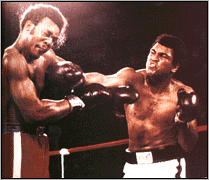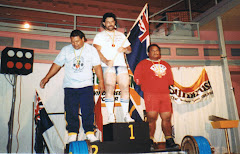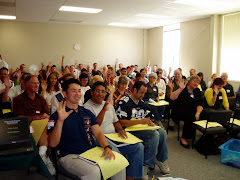- Would you like people to notice the work you've been doing?
- Would you like people to think of you when they need a person with your skills and knowledge?
- Would you like to gain that promotion or advance your career?

Colin's Collection of Comments

 to yourself "...there are less fortunate people on the planet than me" and finally - "...always look on the bright side of life!"
to yourself "...there are less fortunate people on the planet than me" and finally - "...always look on the bright side of life!" ptimistic view.
ptimistic view. 

Stress Scale
A study of 5,000 people was undertaken to determine the level of stress people experience in 43 activities. The activities listed are ones we are faced with during the course of our lives. They retrospectively assesed their percieved level of stress of each of them and the top 14 activities I've listed below along with the score allocated to each of them. This list of stressors is known as the Holmes-Rahe Social Readjustment Rating Scale:
A closer look brings some interesting perspectives. How about Divorce which scored as number 2 and scored 73 points. Have you ever heard of people holding a "Happy Divorce Party"? That's right they are holding a party, celebrating that they just got divorced! How about including marital separation too? Another happy, amiable seperation! Then there are those that go to prison (#4 - 63 points) who are pleased they'll now have a roof over their head and 3 meals a day.
We've all observed people getting seriously stressed out over something and stood wondering how the hell does that small thing cause so much stress! (or am I the only one who has seen this happen?). When this happens, you'll find often that the stressed person is quite vocal about what it is that stresses them out - thus the title: Stress, the NOT so silent killer.
I'm sure I'm not the only one that has worried themself sick at some stage in their life, over something. I've found myself in the past, staying awake late at night, unable to get to sleep and forgotten what I was doing, while supposedly at work during the day. My unique stressors occuping all my thoughts and draining me emotionally as each dragging minute passes by. Loss of focus, energy and at times, losing the will to go on with life. This is no joke and sadly many can be so stressed that they take their own lives or the lives of others (not good!).
I read recently that 3 people here in NZ had committed suicide because their homes had been completely ruined due to damp rot. The house had been constructed with non treated timber and as a result was rotten and unable to be repaired, so the house was worthless! I didn't see loss of your home scoring high in the Holmes-Rahe scale, yet people have taken their lives due to the complete loss of the value of their home.
 unravelling a badly tangled fishing line, yet well worth it in the long run.
unravelling a badly tangled fishing line, yet well worth it in the long run. 
 how me where it says that success comes easily. Show me someone who has attained their all time best performances on a global scale, and committed only partially to their own success. Where does hard work, dedication, sacrifice and long hours of applying oneself to the fulfillment of a life long dream NOT ask of you - your all? Asks of you your every fibre of being, every drop of blood stained sweat and demand fully of you, your precious time and your money.
how me where it says that success comes easily. Show me someone who has attained their all time best performances on a global scale, and committed only partially to their own success. Where does hard work, dedication, sacrifice and long hours of applying oneself to the fulfillment of a life long dream NOT ask of you - your all? Asks of you your every fibre of being, every drop of blood stained sweat and demand fully of you, your precious time and your money. 
 oaching, training, presnting, politics, investments, marriage etc... the universal law of maximum effort births maximum results can not be ignored or avoided.
oaching, training, presnting, politics, investments, marriage etc... the universal law of maximum effort births maximum results can not be ignored or avoided.
 such away, yet I've heard parents say the same thing that was said to me, to their children "... don't say hate. Hate is a strong word and you don't mean - hate. You mean you dislike it".
such away, yet I've heard parents say the same thing that was said to me, to their children "... don't say hate. Hate is a strong word and you don't mean - hate. You mean you dislike it".  ake action and do something about it. For some I meet, they wont change until they actually hate the situation they are in, and then, finally, they'll take action and make the change needed.
ake action and do something about it. For some I meet, they wont change until they actually hate the situation they are in, and then, finally, they'll take action and make the change needed. from our every experience we have on our life's journey.
from our every experience we have on our life's journey.
 to her and says in a sincere manner, "I'm sorry honey, I didn't mean what I said and I shouldn't have said what I did. Please forgive me". She tells him sorry wont fix it and then takes the offensive and pushes him away and starts her on barrage of words. He repeats his apology to her, with her not accepting it, followed by a day or more of distancing and detachment.
to her and says in a sincere manner, "I'm sorry honey, I didn't mean what I said and I shouldn't have said what I did. Please forgive me". She tells him sorry wont fix it and then takes the offensive and pushes him away and starts her on barrage of words. He repeats his apology to her, with her not accepting it, followed by a day or more of distancing and detachment.  's, which you are now to load into the system and make available to the client.
's, which you are now to load into the system and make available to the client. 
Well there you go! You now have a few more ideas on how to address this situation when it happens to you (it will if it hasn't already), whether you are a mum, son, or senior manager.
(oh, and a plug at schools - you also need to get better at doing this too! Read an upcoming article titled "What are you teaching them?")
I hope that you'll be more aware of the role that you play, when faced with having to deal with someone who has made a mistake in your life and the mistake, accident or error impacts you. It's a defining moment for you both. If dealt with correctly, it can become an opportunity to grow you both.
Oh, as for the bank processor story told at the beginning:
"What a pathetic way to deal with an honest and innocent mistake made by one of your employee's.
Shame on you WESTPAC BANK!"
For more background on this banking blunder, click on:
http://www.3news.co.nz/National/Story/tabid/423/articleID/105533/cat/640/Default.aspx
 always done. Not ever challenging why they do what they do or even consider the possibility, that things can and could be done in a better, more innovative way.
always done. Not ever challenging why they do what they do or even consider the possibility, that things can and could be done in a better, more innovative way.

 achieving a positive outcome for all parties. In the lethal weapon style of communication, there are no rules, nor is there a positive outcome for all parties. Only 1 outcome is achieved and pursued, which is the preferred speedy elimination, of the person you are speaking to and your own exaltation, by any means possible - so that you win!
achieving a positive outcome for all parties. In the lethal weapon style of communication, there are no rules, nor is there a positive outcome for all parties. Only 1 outcome is achieved and pursued, which is the preferred speedy elimination, of the person you are speaking to and your own exaltation, by any means possible - so that you win!









































